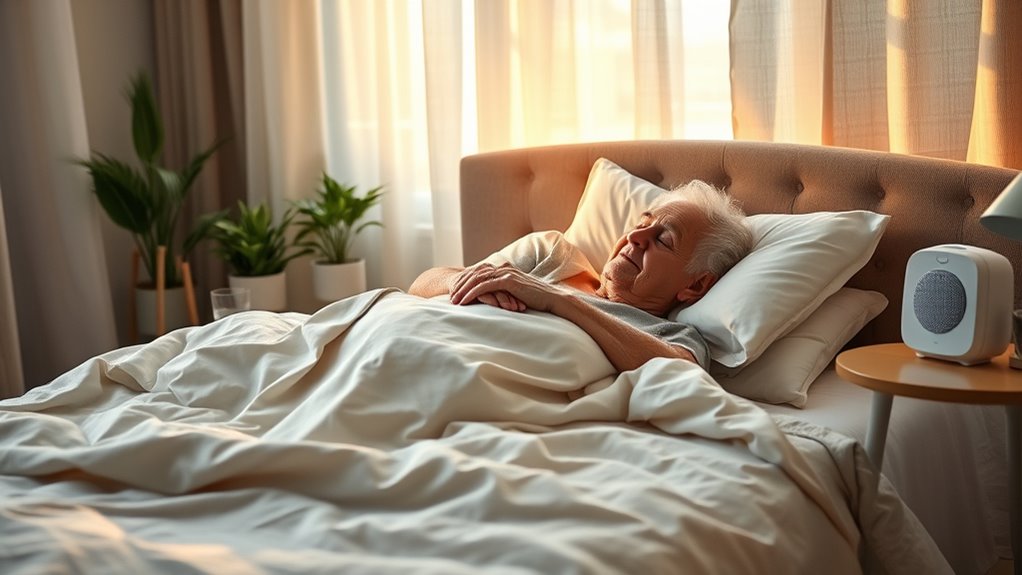To improve your sleep quality as a senior, establish a calming bedtime routine and go to bed at the same time daily. Keep your bedroom cool, dark, and quiet, and avoid caffeine or large meals before sleep. Get sunlight in the morning, stay physically active during the day, and minimize screen time before bed. Tracking your habits can help you identify patterns and make adjustments. Keep exploring for more tips to enjoy restful nights consistently.
Key Takeaways
- Establish a consistent bedtime routine with calming activities to signal your body it’s time to sleep.
- Keep your bedroom cool, dark, and quiet, using blackout curtains and white noise machines if needed.
- Limit caffeine, large meals, and fluids before bedtime to reduce disruptions during the night.
- Get morning sunlight and engage in regular, moderate physical activity to regulate your internal clock.
- Track your sleep patterns and make adjustments to routines and environment for better sleep quality.

Getting enough quality sleep is essential for seniors to maintain their health, mood, and overall well-being. As you age, your sleep patterns can change, making it harder to get restorative rest. To improve your sleep quality, focusing on good sleep hygiene is key. Sleep hygiene involves adopting habits that promote restful sleep and creating an environment conducive to relaxation. One of the most effective ways to do this is to establish a consistent bedtime routine. When you go to bed and wake up at the same time each day, your body begins to anticipate sleep, helping regulate your internal clock and making it easier to fall asleep and stay asleep throughout the night.
Your bedtime routines should be simple and calming. Avoid stimulating activities like watching TV or using your phone right before bed, as the blue light emitted by screens can interfere with melatonin production, the hormone that signals your body it’s time to sleep. Instead, consider winding down with gentle activities like reading a book, listening to soft music, or practicing relaxation techniques such as deep breathing or meditation. These habits signal to your brain that it’s time to shift into sleep mode, helping you drift off more easily.
Creating a sleep-friendly environment also plays a vital role. Keep your bedroom cool, quiet, and dark to foster an atmosphere that encourages deep sleep. Invest in comfortable bedding and consider blackout curtains if outside light disrupts your slumber. Limiting noise with earplugs or white noise machines can also make a significant difference. Moreover, avoid consuming caffeine or large meals close to bedtime, as these can disrupt your ability to fall asleep or cause discomfort during the night. Proper air quality can also support better sleep, as pollutants and allergens in the air can interfere with breathing and restfulness.
In addition to a solid bedtime routine, practice good sleep hygiene during the day. Get some sunlight early in the morning, as natural light helps regulate your internal clock. Incorporate regular physical activity into your daily schedule, but avoid vigorous exercise close to bedtime. Staying hydrated is important too, but try to limit fluids in the hours before bed to reduce nighttime trips to the bathroom. Engaging in remote work or other mentally stimulating activities late in the day can interfere with your ability to relax and fall asleep easily, so plan leisure or calming activities instead. Additionally, being aware of your sleep environment can help you identify and address any factors that might be disrupting your rest. Researchers also emphasize that understanding sleep patterns and tracking them can provide insights into improving sleep quality over time. Monitoring your sleep habits with sleep trackers can give you valuable data to optimize your nighttime routine.
Frequently Asked Questions
Can Certain Medications Affect Seniors’ Sleep Quality?
Certain medications can affect your sleep quality by causing medication side effects that lead to sleep disruption. You might find it harder to fall asleep or stay asleep throughout the night. Some drugs, especially those for anxiety, pain, or allergies, can interfere with your rest. It’s important to discuss your medications with your healthcare provider to understand potential impacts and explore alternatives if sleep issues persist.
How Does Sleep Apnea Impact Older Adults?
Like a thief in the night, sleep apnea quietly steals your restful sleep. It causes sleep disruption and breathing difficulties that can leave you feeling exhausted during the day. As you age, this condition becomes more common and harder to notice. Addressing sleep apnea is vital, because untreated, it increases risks of heart problems and cognitive decline. Seek medical advice to improve your breathing and restore peaceful sleep.
Are There Safe Sleep Aids Suitable for Seniors?
You might wonder if there are safe sleep aids for seniors. Natural remedies like melatonin or herbal teas can help, but always check with your doctor first. Improving your sleep environment by keeping your room dark, quiet, and cool can also promote better sleep. Avoid heavy meals or screens before bed. These simple steps can support restful sleep without risking side effects from medications.
What Role Does Diet Play in Senior Sleep Health?
Imagine your diet as a nightly lullaby that either rocks you to sleep or keeps you tossing. You play a starring role in nutrient absorption and meal timing, which influence your sleep quality. Eating too late or heavy can disrupt your rest, while well-timed, balanced meals promote relaxation. Focus on light, nutritious snacks before bed, and give your body the best chance to drift into peaceful slumber.
How Can Caregivers Support Better Sleep for Seniors?
You can support better sleep for seniors by establishing consistent bedtime routines that signal winding down. Create a calming sleep environment by keeping the room dark, quiet, and cool. Encourage regular sleep and wake times, limit screen time before bed, and avoid caffeine late in the day. Your involvement helps seniors feel secure and relaxed, making it easier for them to fall asleep and enjoy restful nights.
Conclusion
By implementing these sleep tips, you’ll find your nights become calmer seas, guiding you to restful shores. Remember, small changes can make a big difference in your sleep quality. Think of your sleep routine as a garden—you need to tend to it regularly to see it flourish. So, stay patient and consistent, and soon you’ll navigate each night with more ease, waking up refreshed and ready to embrace each new day with renewed energy.









